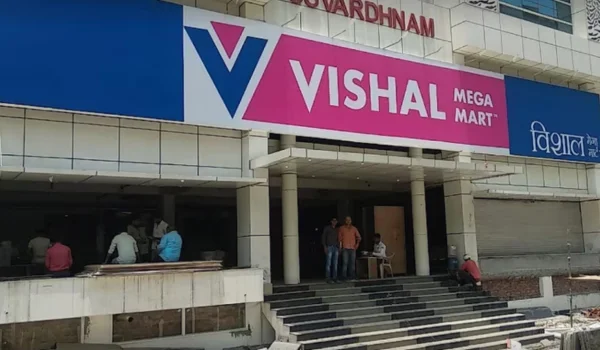Founded in 1986 by Ram Chandra Agarwal, Vishal Mega Mart (VMM) is one of India’s fastest-growing value retail brands, operating over 600 stores across 392+ cities as of FY24, with strong presence in Tier‑2 and Tier‑3 markets. Known for offering a wide range of apparel, household essentials, and grocery items at affordable prices, its customer base is largely middle‑ and lower‑middle‑income shoppers.
VMM is attractive to franchisees due to:
- Strong brand recognition and customer loyalty.
- High revenue share (85–90% stays with franchisee).
- Moderate setup time (2–3 months) and payback estimated at 12–24 months.
💰 Franchise Cost & Financial Overview

📊 Investment & Key Metrics Table
| Component | Estimate (₹ lakh) |
| Required Floor Space | 1,000–3,000 sq.ft (or up to 5,000 sq.ft) |
| Franchise / Setup Fee | ₹5–10 L |
| Infrastructure & Interiors | ₹20–40 L |
| Initial Inventory | ₹15–30 L |
| Initial Working Capital / Staff | ₹5–10 L |
| Total Estimated Investment | ₹35–60 L (up to ₹90 L/₹1 Cr in larger format) |
| Revenue Share to Franchisee | ~85–90% |
| To Brand (Royalties) | ~10–15% |
| Breakeven / ROI Timeline | 12–24 months |
| Staff Requirement | ~15–20 employees |
| Setup Time | 2–3 months |
- According to BestFranchiseConnect and IndianFranchise.in, total investment ranges from ₹35–60 L for smaller stores, scaling to ₹90 L–₹1 Cr for larger 3–5k sq. ft formats.
- Revenue split allows franchisees to retain around 90% of sales, while Vishal Mega Mart retains 10% for supply, branding, and support.
- The company has yielded paybacks in ~19 months on average, supported by efficient cost structures and increasing same‑store sales growth (~13–14%).
🏗 Franchise Model & Brand Support
Business Model
Vishal Mega Mart franchisees operate supermarket-style stores covering groceries, apparel (which is ~45% of revenue), household products, and kitchenware. Stores are generally leasehold. VMM prefers locations in areas with at least 1 lakh population, strong road connectivity, parking availability, and frontage of ≥40 ft.
Support Services
Franchisees receive extensive support:
- Site evaluation & interior design templates.
- Billing and inventory management software.
- Training modules on merchandising, store operations, and product planning.
- Ongoing supply chain management and replenishment.
- Marketing collaterals and support for grand opening.
- Dedicated relationship managers for operational assistance.
While digital marketing is limited, localized advertising assistance and POS support are available at setup and periodically.
📈 Revenue Potential & ROI Expectations
Sample Financials
Assuming monthly sales of ₹50 lakh:
- Inventory cost ≈ ₹25 L (50%)
- Staff, rent, utilities ≈ ₹10 L
- Franchise commission (10%) ≈ ₹5 L
- Net Profit ≈ ₹10 L/month → ~₹1.2 crore annually.
On a ₹60 lakh investment, this equates to ~120% return in year one—though this is optimistic and assumes ideal store performance. More conservative margins often yield ROI of 25–40% annually, with break-even generally around 12–24 months depending on location and execution quality.
Industry Benchmark
Vishal Mega Mart fractured stores typically achieve EBITDA margin ~14%, with profit margins around 5% overall at corporate level but significantly higher at store level due to inventory and cost efficiencies.
✅ Eligibility & Ideal Franchisee Profile
To qualify, applicants generally need:
- Minimum 21 years age; Indian nationality.
- Property/ location: prime high-footfall area (1,000–3,000 sq.ft or more), with good access, visibility, and parking.
- Financial capacity: able to invest ₹35–60 L (or more for larger formats), plus sufficient working capital.
- Team capacity: ability to manage ~15–20 staff and daily supermarket operations.
- Documents: PAN, Aadhaar, GST, shop NOC, address and identity proofs, business PAN/TAN, etc.
- Optionally prior retail or supermarket experience, but not mandatory if you commit to adhering to SOPs.
📝 How to Apply: Step-by-Step
- Visit the official Vishal Mega Mart franchise portal and submit inquiry with photos or sketch of your proposed site and business profile.
- Initial Screening: VMM evaluates your site, financials, demographics suitability.
- Site Assessment: Brand conducts location survey, checks catchment area, frontages, population density.
- Agreement & Fee Payment: Sign franchise agreement (typically 5‑year term), pay franchise fee ₹5–10 lakh.
- Setup and Stock: Interior fit-out, install POS systems, stock inventory as per VMM list.
- Training: Attend operational training and soft launch under brand guidance.
- Go Live: Open store; brand supports initial promotions.
- Ongoing Support: Inventory restocking, operations audits, marketing refresh, and relationship support continue post-launch.
⚖️ Pros & Cons of Investing
✅ Advantages
- High revenue retention (~90%) for franchisees.
- Strong brand recall in underserved markets yields good footfall.
- Quick payback (avg ~19 months) and healthy margins at store level.
- Operating support, SOP guidelines, and supply chain network provided.
❌ Considerations
- Capital-intensive setup, especially for larger formats—investment up to ₹1 crore or more.
- Moderate vehicle for digital marketing; local marketing burden often lies with franchisee.
- Operational intensity: Managing inventory, staff, and delivery logistics can be demanding.
- Competitive retail sector: competing with D-Mart, Spencer’s, local kiranas, and online quick commerce apps.
- Quality perception issues: Reddit users warn of inconsistent product quality—especially low-cost apparel items may disappoint some consumers.
- Franchise risk alert: as one Reddit user noted, “franchise is always a headache”, and brands may offload riskier outlets to franchisees while retaining prime stores themselves.
💡 Expert Tips Before You Commit
- Visit operating Vishal Mega Mart stores in similar sized towns to assess layout, product mix, and customer behavior.
- Talk with existing franchisees, especially in nearby towns, about supply efficiency, margins, and support quality.
- Negotiate lease/rent escalation clauses; real estate is a major overhead.
- Prepare buffer capital for 6–12 months to account for ramp-up and slow months.
- Ensure clarity on territory exclusivity, stock pricing flexibility, and renewal terms in the contract.
🧾 Franchisee Quick Summary
- Investment required: ₹35–60 lakh (up to ₹1 Cr for larger stores)
- Area needed: 1,000–3,000 sq.ft (some formats up to 5 k sq.ft)
- Staff: ~15–20 employees
- Revenue share: 85–90% to franchisee
- Payback: 12–24 months typically
- Contract term: industry-standard 5 years, renewable
- Supporting docs: GST, PAN/Aadhar, NOC, shop address proof, bank statements
- Profit potential: gross profit ~30–40%, net store-level margin ~20–30%
🎯 Final Verdict
A Vishal Mega Mart franchise represents a relatively lower-risk entry into India’s supermarket retail space—especially for investors with access to prime space and a knack for operations. Strong brand reach in non-metro India, coupled with high revenue retention, makes it financially attractive. With efficient execution, break-even can be achieved in under two years, delivering sustainable returns over longer tenure.
However, careful due diligence—site validation, contract review, operational planning, and competitor evaluation—is essential. Franchise opportunities are best for entrepreneurs committed to managing retail operations, staffing efficiencies, and customer experience over 2–3 years.

Shashi Kant is the Founder and Editor of BusinessScroller.com, a leading platform for business insights, finance trends, and industry analysis. With a passion for journalism and expertise in business reporting, he curates well-researched content on market strategies, startups, and corporate success stories. His vision is to provide valuable information that empowers entrepreneurs and professionals. Under his leadership, BusinessScroller.com has grown into a trusted source for in-depth articles, customer care guides, and financial expertise.



Hi,
I’m interested in learning more about your franchise model and the process to get started. Currently, I operate a Zepto dark store in Sector 52, Noida under Koncept E-Commerce.
Please share the details and requirements for the franchise partnership.
Best regards,
Kuber Adhikari
Koncept E-Commerce
Noida, Sector 52
Outlet Services retail store and disturbing benefits of All brands of All company All services outlet